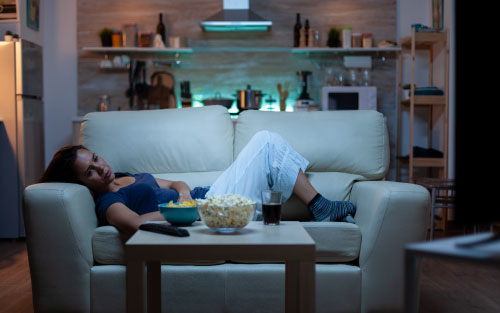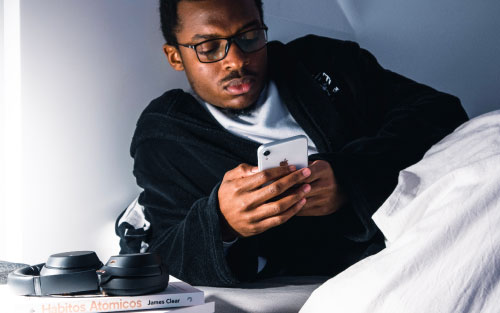We should be sleeping approximately one-third of our lives or about eight hours a night. In addition, the most important hours of sleep are the hours before midnight. A good night’s sleep will be from 10 p.m. to 6 a.m. in the winter and 10 p.m. to 5 a.m. in the summer. It is important to get a little more sleep in the winter as our body goes into a “mini- hibernation,” and the sun goes down earlier.
 Many people tell me that they stay up late watching TV, Netflix, movies, YouTube, or the news. If they are not in front of the big flat-screen TV, they are scrolling through Instagram, Facebook or playing on the computer when they could be in bed sleeping. Going to bed late will lead to anxiety and an increase in stress levels, which can be one of the contributing factors in memory loss, fatigue, and weakening your immune system. Furthermore, watching television will expose you to junk food advertising and subliminal messaging that could cause you to start snacking late at night.
Many people tell me that they stay up late watching TV, Netflix, movies, YouTube, or the news. If they are not in front of the big flat-screen TV, they are scrolling through Instagram, Facebook or playing on the computer when they could be in bed sleeping. Going to bed late will lead to anxiety and an increase in stress levels, which can be one of the contributing factors in memory loss, fatigue, and weakening your immune system. Furthermore, watching television will expose you to junk food advertising and subliminal messaging that could cause you to start snacking late at night.
One of the easiest ways to lose weight is to get to bed at least two hours before midnight and turn off your cell phone, TV, and especially the news. This will actually decrease your belly fat by reducing cortisol levels and help with diabetes, as well. How cool is it that you can actually lose weight, strengthen your immune system, reduce anxiety, increase energy, help with diabetes, and improve memory function just by refining your sleeping habits?
If you want to get to bed earlier, it is also important to avoid eating late at night. The most effective way to accomplish this is through intermittent fasting. Intermittent fasting can be defined as eating for eight hours (between the times of 9 a.m. and 5 p.m.) and fasting for sixteen hours (from 5 p.m. to 9 a.m.) The fasting period gives your body ample time to process the food you have already eaten and helps improve your quality of sleep. The purpose of eating is to accumulate energy. Given this information, eating late at night doesn’t make sense! Why give yourself more energy at nighttime? It will only make falling asleep and staying asleep more difficult. Remember to help with circadian rhythms and have a healthy sleep cycle, it is best to “eat like a king for breakfast, a prince for lunch, and a pauper for dinner.” Breakfast is the most important meal of the day. Instead of loading up with carbohydrates like cereal, oatmeal, toast, or a bagel, it is better to focus on eating lots of fats and proteins. Good healthy fats include avocado, olives, coconut, nuts, and fish, and good healthy proteins include poultry, eggs, lentils, beans, and seeds. Many green vegetables like peas, spinach, broccoli, kale, and asparagus also have a lot of healthy protein, as well.
Not only is it very important to get to bed at least 2 hours before midnight, but it is even more important to get good, quality sleep. One way to improve the quality of your sleep is to exercise at least 3-4 times a week. A good exercise routine will tire out your body and help you sleep better at night. And remember, the best time to exercise is in the morning, while cortisol and testosterone levels are highest. Changing your lifestyle to get to bed earlier will have you naturally waking up earlier, and you can use those early morning hours to get some great exercise. Choose exercises that you really enjoy so you are having fun while getting fit.
 Another important factor in getting quality sleep is reducing blue light exposure. Blue light can be found on your computer, cell phone, TV, iPad, and other electronic devices. It is recommended you cease all electronic use after 6 p.m because it is best to stop four hours before bedtime. Electronics expose you to blue light that stimulates cortisol, the stress hormone, and that disrupts proper sleep patterns and circadian rhythms. Cortisol also destroys cells in the hippocampus, which will lead to memory loss. If you have a job that requires a lot of staring at screens after 6 p.m., invest in blue-light-blocking glasses. While you sleep, keep your Wi-Fi and cell phone off. Eliminate all lights in your bedroom such as light coming from windows, alarm clocks, and electronic devices.
Another important factor in getting quality sleep is reducing blue light exposure. Blue light can be found on your computer, cell phone, TV, iPad, and other electronic devices. It is recommended you cease all electronic use after 6 p.m because it is best to stop four hours before bedtime. Electronics expose you to blue light that stimulates cortisol, the stress hormone, and that disrupts proper sleep patterns and circadian rhythms. Cortisol also destroys cells in the hippocampus, which will lead to memory loss. If you have a job that requires a lot of staring at screens after 6 p.m., invest in blue-light-blocking glasses. While you sleep, keep your Wi-Fi and cell phone off. Eliminate all lights in your bedroom such as light coming from windows, alarm clocks, and electronic devices.
My favorite way to get a good night’s sleep is to do something outside during sunrise, as well as sunset. The worst thing for the brain is for you to be inside at 8 p.m. and all the lights are on, the television is on, the computer is on, the cellphone is on, and the iPad is on. The brain will be overstimulated and will not be able to relax when you are trying to sleep. Being outside during sunrise and sunset informs your brain of the proper time so it can wake up and give you energy in the morning, and relax and calm down at night.
The key is to get into a really deep sleep, which is the third stage of non-rapid eye movement sleep. Many people sleep in the rapid eye movement (REM) phase, but are not getting the proper 1-2 hours of deep sleep every night. We should not wake up in the middle of the night to pee, or rollover, or check the time on our cell phones. We should wake up in the morning saying, “How long have I been out?” or even, “What time/day is it?” That is when you get your deep sleep. We should also be able to wake up on our own and not to an alarm clock. Following the recommendations above will help you get a good night’s sleep with plenty of deep sleep and REM, which will rejuvenate and re-oxygenate your brain to keep it healthy, boost your brainpower, and improve memory and focus.
 Most recently, due to the high stress of 2021, people have been losing more sleep than ever. If you do not sleep well, not only is your memory affected, but you are going to weaken your immune system and make you more susceptible to Covid-19. During your sleep, the body has a chance to relax, revamp, and re-energize. If you want the best outcome if you are exposed to the coronavirus or the flu, it all starts with a good night’s sleep. Hopefully this will inspire you to take your sleep seriously and start these recommendations immediately.
Most recently, due to the high stress of 2021, people have been losing more sleep than ever. If you do not sleep well, not only is your memory affected, but you are going to weaken your immune system and make you more susceptible to Covid-19. During your sleep, the body has a chance to relax, revamp, and re-energize. If you want the best outcome if you are exposed to the coronavirus or the flu, it all starts with a good night’s sleep. Hopefully this will inspire you to take your sleep seriously and start these recommendations immediately.

